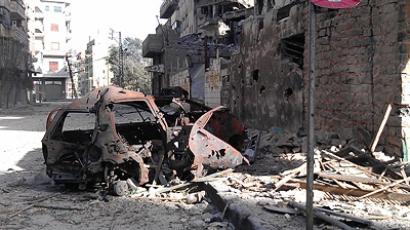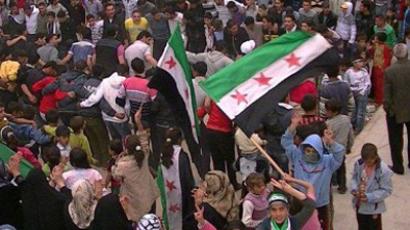Syrian opposition pushes for Russian support
The Syrian opposition says they sense a shift in Russia’s stance over Syria and are lobbying for Russia to ratchet up pressure on Assad to comply with the UN-brokered peace plan. They emphasized the importance of Russian support in the conflict.
Members of the National Coordination Body for Democratic changes were in Moscow today to discuss a resolution to the conflict.Hassan Abdul-Azim, the head of opposition group said that Russia’s support was essential in bringing the 13-month conflict to a peaceful resolution.He called the UN-Arab league peace plan Syria's "last chance to put out the flames of fratricidal carnage."Russian Foreign Minister Sergey Lavrov for his part said that the ceasefire in place since last Thursday was “fragile” and called for the armed rebel groups to cooperate with Kofi Annan’s six-point peace plan. He emphasized the fact that some countries are undermining the plan by supporting armed military groups.Russia along with China had previously blocked two separate Security Council resolutions on the Syrian conflict, considering them unbalanced in favor of the opposition and regime change.It got behind Kofi Annan’s peace initiative after it was agreed that a Russian would be included in the group of international monitors traveling to Syria.Deputy Foreign Minister Sergey Ryabkov said Russia would be "substantially" represented in the observers’ mission, essential to glean “a reliable and objective picture of what is happening."
Sanctioning peace
The ceasefire stipulated by Annan’s peace plan came into effect on Thursday, however there have been multiple reports of government shelling. On Monday the London-based organization the Syrian Observatory for Human Rights said that 26 were killed in violence across Syria.Syria’s state-run news channel SANA said that three people had died on Sunday following rebel attacks.President Assad has blamed the violence on foreign-funded armed terrorist groups and criticized the international community for extending their support to opposition forces.Meanwhile, the so-called Friends of Syria, a group of countries which claim peace in Syria to be their objective, have gathered in Paris to discuss more sanctions on Damascus. Opening the meeting of 57 nations, French Foreign Minister Alain Juppe said the sanctions have already shrunk Syria’s financial reserves by half.Although the actual size of Syria's financial reserves is unknown, it is believed to be around US$17 billion. Juppe also urged the United Nations Security Council to firmly react to any violation of a UN-backed peace plan by Damascus.Friends of Syria was set up with a view to bypassing the Chinese-Russian veto of the UN Security Council resolutions. It has consistently supported opposition groups and rallied to provide it with monetary support.However, the fragmented nature of the armed Syrian opposition and its lack of unity have raised fears that providing it with support could trigger a significant deterioration in the conflict.“When people start seeing violence, shootings, killings it gets much worse obviously and then a lot of other factors start to come in,” international consultant and author Adrian Salbuchi told RT.He warned that the support of these armed groups “does not promote democracy but quite the opposite – it promotes chaos and tyranny.”
Dr Franklin Lamb, the director of Americans Concerned for Middle East Peace, believes that the opposition agreed to a ceasefire just to buy some more time.“The rebels do not want dialogue,” he stated, “when there is a dialogue and ceasefire that is going to allow the opposition to regroup, to develop, to receive aid from Qatar and Saudi Arabia directly, but indirectly from the United States.”
The United States want dialogue now for the exact same reason, Lamb added.














